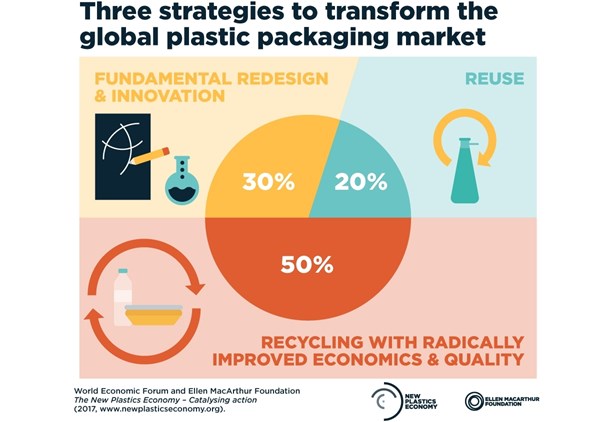Welcome to the New Plastics Recycling Economy
A new report provides a clear transition strategy for the plastics industry to design better packaging, increase recycling rates and introduce new models for making better use of packaging.
A new report provides a clear transition strategy for the plastics industry to design better packaging, increase recycling rates and introduce new models for making better use of packaging.
We all know the phrase talk is cheap. So let’s be real—a lot of the talk about plastics packaging recycling has been more marketing speak than action (not all but some). Not pointing fingers at the industry or consumers but if we truly want to solve this issue, something has to change.
Given that, I was encouraged to see on Jan. 16, The Ellen Mac Arthur Foundation and World Economic Forum released “The New Plastics Economy: Catalysing Action,” which aims to address global plastics issues through innovation in packaging design, recycling, and delivery models. The report looks to present a path to increasing global recycling rates for plastic packaging from just 14% today to 70% or more.
Some of the findings in the report include:
- Without fundamental redesign and innovation, about 30% of plastic packaging will never be reused or recycled.
- For at least 20% of plastic packaging, reuse provides an economically attractive opportunity.
- With concerted efforts to redesign packaging and the systems for managing it after use, recycling would be economically attractive for the remaining 50% of plastic packaging.
About 40 businesses and government leaders have endorsed the new action plan to tackle global plastics waste issues, and together are working to create a more effective global system for end-of-life plastics.
Per the report:
“The New Plastics Economy is an ambitious, three-year initiative to build momentum towards a plastics system that works.”
It applies the principles of the circular economy and brings together key stakeholders to rethink and redesign the future of plastics, starting with packaging. Launched in May 2016, the initiative is spearheaded by the Ellen MacArthur Foundation, in collaboration with a group of leading companies, cities, philanthropists, policy makers, designers, academics, students and NGOs.
The New Plastics Economy focuses on five interlinked building blocks to create the enabling conditions for a transformative system shift:
- Dialogue mechanism
- Global plastics protocol
- Innovation moonshots
- Evidence base
- Stakeholder engagement
Since its inception, the group claims the initiative has made significant progress across all these key elements. Based on the analysis and insights from this report, the New Plastics Economy initiative has now defined a series of catalyst actions to drive further progress in 2017.
Some more items of note:
In 2016, the potential economic impact of a Global Plastics Protocol was assessed and the analysis clearly indicated that the implementation of changes to design after-use systems as part of such a protocol would improve the economics of plastic packaging recycling. In 2017, the initiative will take the next step towards the concrete development of a Global Plastics Protocol. It will collaboratively determine the top opportunities for design changes to enhance recycling quality and economics, as well as material health.
I encourage you to read the report in its entirety.

Related Content
-
BASF Highlighting How They 'Make, Use and Recycle Future Solutions'
NPE2024: BASF is using its proprietary computer-aided engineering tool Ultrasim when designing for sustainability in a broad range of industries.
-
How to Optimize Color Evaluation of Recycled Plastics
The right color measurement instrument and good working methods will minimize variability in color evaluation of PCR.
-
ICIS Launches: Ask ICIS Generative AI Commodities Assistant
Said to be the first of its kind, this AI assistant will enhance access to ICIS’ intelligence and insights for the energy and chemical markets.















